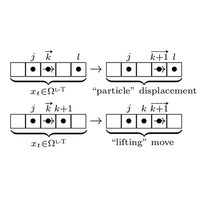提升的 TASEP:加速多粒子马尔可夫链的可解范式
IF 11.6
1区 物理与天体物理
Q1 PHYSICS, MULTIDISCIPLINARY
引用次数: 0
摘要
几乎所有用于给定分布采样的马尔可夫链蒙特卡洛算法都是可逆的,并且满足详细平衡条件。对于局部链而言,这会导致对样本空间进行缓慢的扩散式探索。通过以给定分布为目标稳态的非可逆算法,可以显著提高速度。然而,用于采样的非可逆算法很难建立和分析,而且对于相互作用的多粒子系统,精确的加速结果非常罕见。在这里,我们引入了 "提升的 "完全非对称简单排除过程(TASEP),作为非可逆多粒子马尔可夫链的精确可解范例。它采样的硬球分布与一维晶格上对称扩散硬核粒子的 Metropolis 算法相同。我们通过一种不同寻常的坐标贝特方差来求解提升的 TASEP,结果表明,与 Metropolis 和基于 Kardar-Parisi-Zhang 的动力学相比,它在稳态渐近的弛豫时间和非渐近混合时间上都表现出了多项式(粒子数)的加速。提升的 TASEP 是成功的硬球事件链蒙特卡洛算法在一维晶格上的简化,我们讨论了它同样可以推广到软相互作用势。本文章由计算机程序翻译,如有差异,请以英文原文为准。

Lifted TASEP: A Solvable Paradigm for Speeding up Many-Particle Markov Chains
Virtually all Markov-chain Monte Carlo algorithms used for sampling a given distribution are reversible, and they satisfy the detailed-balance condition. For local chains, this leads to a slow, diffusive exploration of sample space. Significant speedups can be achieved through nonreversible algorithms with the given distribution as a targeted steady state. However, nonreversible algorithms for sampling are difficult to set up and to analyze, and exact speedup results for interacting many-particle systems are very rare. Here, we introduce the “lifted” totally asymmetric simple exclusion process (TASEP) as an exactly solvable paradigm for nonreversible many-particle Markov chains. It samples the same hard-sphere distribution as the Metropolis algorithm for symmetrically diffusing hard-core particles on a one-dimensional lattice. We solve the lifted TASEP by an unusual kind of coordinate Bethe ansatz and show that it exhibits polynomial (in particle number) speedups in the relaxation time for the asymptotic approach of the steady state, as well as the nonasymptotic mixing time, compared to both Metropolis and Kardar-Parisi-Zhang-based dynamics. The lifted TASEP is the reduction onto the one-dimensional lattice of the successful hard-sphere event-chain Monte Carlo algorithm, and we discuss that it can likewise be generalized to soft interaction potentials.
求助全文
通过发布文献求助,成功后即可免费获取论文全文。
去求助
来源期刊

Physical Review X
PHYSICS, MULTIDISCIPLINARY-
CiteScore
24.60
自引率
1.60%
发文量
197
审稿时长
3 months
期刊介绍:
Physical Review X (PRX) stands as an exclusively online, fully open-access journal, emphasizing innovation, quality, and enduring impact in the scientific content it disseminates. Devoted to showcasing a curated selection of papers from pure, applied, and interdisciplinary physics, PRX aims to feature work with the potential to shape current and future research while leaving a lasting and profound impact in their respective fields. Encompassing the entire spectrum of physics subject areas, PRX places a special focus on groundbreaking interdisciplinary research with broad-reaching influence.
 求助内容:
求助内容: 应助结果提醒方式:
应助结果提醒方式:


